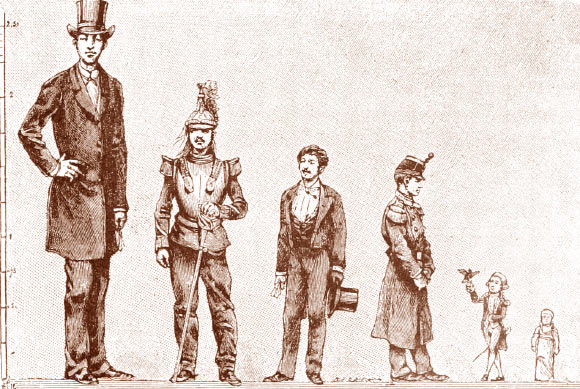Eighty-three height-associated genetic variants have been discovered in a large-scale study led by researchers from Queen Mary University of London, Montreal Heart Institute, the Broad Institute and the University of Exeter. The research appears today in the journal Nature.

Eirini Marouli et al report 83 height-associated coding variants with lower minor-allele frequencies and effects of up to 2 cm per allele, greater than ten times the average effect of common variants. Image credit: Popular Science Monthly, D. Appleton and Company, 1887.
Adult height is mostly determined by the information encoded in our DNA – children from tall parents tend to be taller, and those from short parents are shorter.
But growth from a small baby into an adult, and the role of genetics, is one of the most poorly understood areas of human biology.
Hundreds of DNA changes (i.e., genetic variations) that influence height have already been identified, but these common DNA changes often influence height by less than 1 mm.
In the new study, an international team of researchers found DNA changes that led to differences in height of up to 2 cm — over 10 times the average effect of previously discovered gene variants.
“Of these 83 genetic variations, some (such as those in IHH, STC2, AR and CRISPLD2) influence adult height by 2 cm, which is enormous. The genes affected by these genetic variations modulate, among other things, bone and cartilage development and growth hormone production and activation,” said lead co-author Prof. Guillaume Lettre, from the Montreal Heart Institute.
“How the body grows from a 40-50 cm baby into a perfectly proportioned adult three to four times the size, and how this occurs such that some of us end up being over half a meter taller than others, is a fascinating but poorly understood aspect of biology,” said co-author Dr. Andrew Wood, from the University of Exeter.
“Our latest discovery means that we can now explain over a quarter of the heritable factors involved in influencing a person’s height.”
To identify the 83 (32 rare and 51 low-frequency) height-associated genetic variants, the team undertook an association study of 241,453 coding variants in 711,428 individuals.
“The success of our study was due to our large sample size,” noted lead co-author Prof. Panos Deloukas, from Queen Mary University of London.
“In our study, we used adult height as a simple observable physical trait to understand how information in our DNA can explain how we are all different,” Prof. Lettre said.
“The idea was that if we could understand the genetics of human height, we could then apply this knowledge to develop genetic tools to predict other traits or the risk of developing common diseases.”
Many of the new variants are located in genes implicated in growth or bone biology, but many also highlight new biological processes that modulate height in humans.
The researchers looked in more detail at two of the changes found in the STC2 gene. Only 1 person in 1,000 carries one of these genetic variants, but those who do are 1-2 cm taller.
Further investigations suggested that these variants modulate height by interfering with the availability of growth factors in the blood.
Studying STC2 may therefore yield new insights into therapeutic strategies to treat growth failure, which affects 3-5% of all children.
“Evaluating whether drugs that block STC2 activity could have an impact on growth seems to us very promising,” Prof. Lettre said.
_____
Eirini Marouli et al. Rare and low-frequency coding variants alter human adult height. Nature, published online February 1, 2017; doi: 10.1038/nature21039







